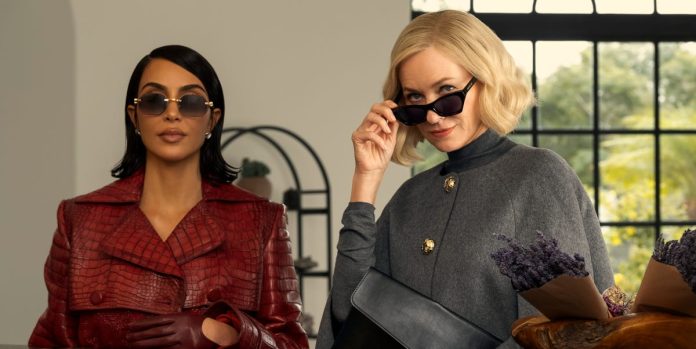All’s Fair is TV’s most expensive meme. The Ryan Murphy-produced Hulu drama stars Naomi Watts, Kim Kardashian, Glenn Close, Niecy Nash and Sarah Paulson as a squad of #GirlBoss lawyers with very real-sounding names like “Allura Grant” and “Emerald Greene.” There are outrageous lines, like “you may think I’m being a greedy pig bottom,” which make the show feel like it’s made to be viewed via screenshots on an Instagram carousel. It practically begs to be a cultural moment. And against the odds—and perhaps the very notion of taste itself?—it has become one.
The first three episodes were met by an overwhelmingly negative response from critics. It debuted with 0% on review aggregator Rotten Tomatoes, which has since climbed to just 4%. Meanwhile, The Guardian’s 0 star review (a brutal rating the paper has only doled out a handful of times) describes the show as “fascinatingly, incomprehensibly, existentially terrible.” However, the numbers tell a slightly different story. Hulu has said that the show is the platform’s most-viewed original scripted debut in three years, with over 3.2m views in its opening days. And on my social feed, fans can’t stop debating whether the show is “so bad it’s good,” or just flat-out bad. (So far, no one has been brave enough to argue that it’s genuinely good.)
On Instagram, Kim Kardashian leaned into the discourse. She jokingly referred to All’s Fair as “the most critically acclaimed show of the year,” and shared viral posts where fans said they were “obsessed” with the “awful” acting, “ridiculous” styling, and “predictable” plots. It’s a fitting response, because this show encapsulates the world the Kardashians have helped to build—one where it’s possible to benefit from even the most negative attention.
Watching All’s Fair, it’s easy to see why so many critics hated it. (Glenn Close, if you’re reading this, blink twice for “help me!”) The show centers the most implausible storylines, the creakiest dialogue, and is a Frankenstein creation of constant materialism and casual cruelty dressed up as “feminism,” all of which make Kim Kardashian’s motionless face and spoof-worthy line delivery feel almost inconsequential. Yet despite all this, I can’t switch off that part of my brain that finds the very existence of All’s Fair weirdly, unsettlingly entertaining. To not engage with this show—and the cultural chasm around it—would almost feel like missing out. For the easily-trolled among us (me) it’s impossible to look away.
Since its release, All’s Fair has been likened to And Just Like That…, which became synonymous with the practice of “hate-watching.” I’m not totally convinced by this comparison, though. When listening to the And Just Like That… The Writer’s Room podcast, I didn’t get the impression that Michael Patrick King and his co-conspirators were intentionally trying to create something bad, even ironically so. And I also didn’t think fans were genuinely “hate-watching” AJLT—really, it was closer to hope-watching, with each week providing tiny glimmers of the Sex and the City characters we once loved. All’s Fair, on the other hand, is more aware of its badness. And as I watched, I found myself feeling almost sadistic—I wasn’t hoping for better, I actually wanted it to get even worse.
It’s worth remembering that critical pushback isn’t necessarily a barrier to something becoming culturally influential. In fact, there is a long history of culture that is considered “low art” being underestimated by critics—especially when it’s created by women and gay men—from the emergence of reality TV in the 2000s way back to the work of Andy Warhol, who of course coined the prescient term “15 minutes of fame.” The extreme reaction to All’s Fair reminds me of Showgirls, a film that was branded one of the worst movies ever made when it was released in 1995, but has now been reframed as a campy cult classic, partly because of how much it was hated at the time.
A reappraisal of All’s Fair is unlikely, but it’s not impossible. Especially when you consider that being rebuked by critics is basically a rite of passage for the Kardashians. Their E! reality show, Keeping Up With The Kardashians, was panned when it premiered in 2007. But Kris Jenner’s brood became a phenomenon regardless, mostly because people simply couldn’t stop talking about them. This is a hallmark of the attention economy, where it doesn’t matter whether you’ve got more haters than fans, because even the most negative attention can be monetized online. Just look at George Santos, the disgraced former congressman who made $600,000 selling personalized Cameo videos before being sent to jail for fraud. (One of the first things Santos did hours after President Trump commuted his sentence was rejoin the platform, where he charges $300 per video, posting: “I’m back!!!”)
Part of what is so frustrating about social media today is that it’s difficult to tell what is real, and what is being posted purely for engagement. I won’t even admit the amount of times recently I’ve had to count to ten before deciding that, no, it’s not worth hitting reply to a purposefully provocative post from someone who is almost certainly trying to game the algorithm. But it’s so hard not to fall for it. All’s Fair conjures that exact same response—the show, and our reaction to it, make it almost feel like a cultural shit-post.
It seems like we’re entering an era where expensive TV shows are essentially engagement bait from streaming platforms, designed to provoke the same feelings of judgement and superiority as the influencers we hate-follow. I wonder if the most revealing thing about All’s Fair is how it holds up a mirror to us, reflecting our need for a shared experience. The desire for connectivity is collectively lowering our expectations.
This all feels vintage Kardashian, whose emergence was similarly equated with a wider cultural decline. In 2011, when Barbara Walters interviewed the family as part of her yearly “10 most fascinating people” series, she seemed vaguely annoyed about it, telling them: “You don’t have any talent!” To her surprise, they agreed. “I don’t think we disagree,” said Kourtney, while Khloe responded: “None of us think we could sing or act or dance.” Sat quietly next to them was Kim, who is now being billed ahead of Glenn Close in a TV drama.
Yes, the reviews of All’s Fair have been brutal, but I suspect that Kim is secretly enjoying being back in the cultural fray. She has long since ascended to the A-list to such an extent that her level of fame is now uncontroversial—almost boring. And here she is, once again forcing people to question their ideas of taste, or what someone in her position should be “allowed” to do. Somehow, this 0-star, 0% show has become another reminder never to underestimate her. I guess all’s fair in love, war—and getting attention.









